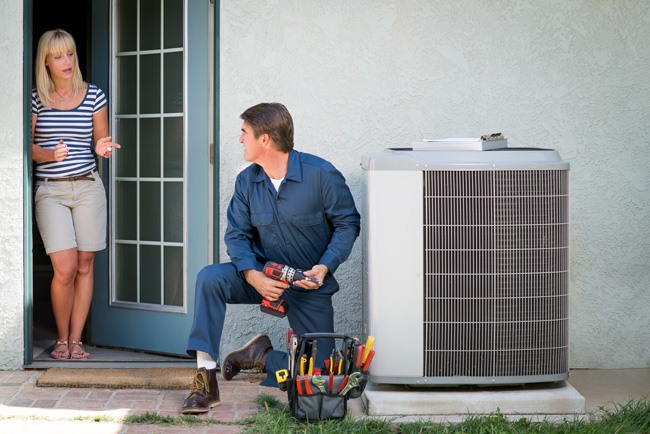
During the hot summer months, your air conditioner might work overtime. This can lead to issues like leaking water, which can become more than just a nuisance over time. It can increase your monthly bills, maintenance, and renovation costs. As a homeowner, this initially mild inconvenience can easily destroy your floors, walls, and ceilings, not to mention your AC.
Besides, mold can develop in the moist areas, thus polluting the air you breathe. To avoid all this, you will need a professional to help you fix all your AC issues.
How Your Air Conditioner Works
Your air conditioner cools the air by removing the heat and transferring it outside. To achieve this, the AC has a filtered return vent that sucks warm, humid air and blows it to the evaporator coil. The AC refrigerant absorbs this heat, turning it into a hot gas. The air is then cool enough to be blown back into your home through the vents. The hot gas left in the coil goes to a compressor that turned it into hotter vapor during this process. After this, the hot gas goes to the condenser that discharges the heat, thus cooling the refrigerant again.
Warm air is constantly blown through the coils during the cooling process, and the heat dissipates. The moisture collected on the coil drips into a drain pan that leads down a drain line.
Below are some reasons why your AC might be leaking water.
1. Disconnected Drain Line
This might be a rare occurrence, but your drain line can be disconnected when someone is working close to your AC or when changing the air filter. Therefore, your AC can leak when the drain line isn’t connected to the drain pan. To solve this, most professionals will look inside the AC to check whether the drain line is attached. If it’s no longer connected, our professionals can immediately take care of the issue, thus ensuring no further damage to your heating and cooling system.
2. Blocked Condensate Drain
The condensate drain can clog whenever there is dirt, mineral deposits, mold, and other debris. The waste can prevent water from flowing through the drain, thus causing additional damage to your AC. By using our services, we get to place a safety device to automatically turn off your AC when the drain clogs. This helps minimize water damage in your home while protecting your AC. Besides, we offer consistent maintenance to ensure that your condensate drain is open and clear.
3. Damaged Drip Pan
Most air conditioners are manufactured to last. However, nothing lasts forever. If you own an old AC, the chances are that your drip pan may be corroded or damaged after decades of everyday use. Therefore, when the drip pan has holes, it can lead to water leakage since condensate seeps through the pan directly. Our specialists can help replace your drain pan to ensure that your AC keeps working as it’s supposed to work.
4. Low Refrigerant Level
When you discover a leak and your AC isn’t cooling well, the refrigerant level might be low because of the leak. Heating and cooling systems depend on refrigerants to create cold air. Therefore, getting seasonal maintenance can be helpful to the health of your AC. When there’s not enough refrigerant, the evaporator coils can freeze, causing an overflow in the drain pan. However, your AC doesn’t require frequent refrigerant refilling unless it has a leak. Using our services allows you to have some peace of mind while we sort out your AC refrigerant issues immediately.
5. Damaged Condensate Pump
Some air conditioners use a condensate pump to drain water. Condensate pumps are crucial when your home’s drain system is above your AC unit. Even if your drain is free from obstructions, water can leak out if the condensate pump stops working. To solve this issue, we always check to ensure that the pump is being powered properly. If the power source is not the issue, we check to see whether the pump is damaged. Both of these approaches help us resolve the issue and keep your air conditioner running smoothly.
6. Dirty Air Filter
Your air conditioner’s filter needs frequent changing to allow enough airflow. Without ventilation, the evaporator coils can freeze due to too much cold. After freezing, the coils will thaw, thus causing excess water to collect in the drain pan. This can lead to an overflow that can only be resolved by changing the air filter. In case the problem remains, your AC might need more repairs. Using professional HVAC services can guarantee that all your problems are solved.
7. Broken Evaporator Coil
When your AC has a broken evaporator coil, you might notice tiny drips instead of a large water puddle. That’s because the water is splashing from the evaporator coil instead of properly draining into the drain pan. This mostly occurs when your coils are grimy or when there are holes in the insulation around the coils. The best approach is annual air conditioning maintenance, thus preventing your evaporator coil from any damage.
8. Poor Maintenance
Your air conditioner needs timely maintenance like most home appliances. Scheduled and routine services allows specialists to clean the unit as many times as they can. During the maintenance, the specialists will check all the aspects of the air conditioner, thus ensuring that you don’t end up with water leakage.
9. Improper Installation
If your AC isn’t installed currently, it can leak water. It’s advisable to use professionals to ensure that the AC is properly installed. Besides, you can check the front part of your AC to make sure that it’s cooler than the rear part. You should have a specialist install your AC with proper inclination to avoid water leakage.
How to Stop Your AC From Dripping Water in the Future
You should prioritize frequently changing your air filter to ensure that the AC has enough ventilation. Besides, you should have a professional conduct frequent maintenance in the spring, thus helping avoid most of your AC problems. During the maintenance, the professional should check your drain pan for rust and cracks. They should also apply treatment to prevent algae growth. Other routine checks should include making sure that the condensate pump works and flushing the drain line.
Should You Use Your AC When It’s Leaking?
You can continue using your AC when it’s leaking water. However, there might be a slight decrease in its ability to cool your home. Because you don’t know the reason behind the leak, it’s advisable to turn the AC off when you spot a water leak. This can help prevent further damage to the inner components, which could eventually lead to a compressor failure. Calling your AC specialist can also help narrow down the cause of the water leaks.
Take Care of Your AC
If you are looking for a reliable heating and cooling company, Liberty Comfort Systems should be your first option. Our specialists are certified and trained to service and maintain your heating and cooling equipment. Our air quality experts can also help you meet your indoor air quality needs. We have outstanding customer service, and we are held to the highest standards. Our technicians are EPA certified and NATE certified, and we are available 24/7 to offer the services you need the most.
Call Liberty Comfort Systems in Anoka, MN if you need help with a leaking AC unit.

